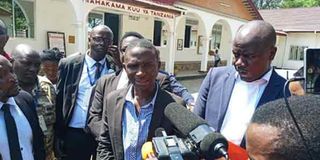Tanzania court sets university student Nondo free after eight months of legal battle

What you need to know:
- The Iringa Resident Magistrate Court in Tanzania has set the Tanzania Students Networking Programme (TSNP) Mr Abdul Nondo free after the prosecution side failed to prove that the accused’ claims that he had been abducted in March, 2018, were untrue.
Iringa. Iringa Resident Magistrate Court has set free the chairman for the Tanzania Students Networking Programme (TSNP) Mr Abdul Nondo after the prosecution failed to prove the charges against him.
Mr Nondo, who is a third-year student at the University of Dar es Salaam, was charged on March 7 with two counts including that of disseminating false information on social media that his life was in danger after being kidnapped, claims prosecutors said were untrue.
In a ruling issued on Monday November 5, 2018, Resident Magistrate Liad Chamshama stated that the state lawyers failed to prove claims that the accused had lied and that even the evidence put forward against him was doubtful.
“Witnesses number 1 – 6 could not even substantiate if the accused had published and disseminated the information claimed to be untrue,” said Mr Chamshama.
In the second count, Mr Nondo was accused of lying to the police at Mafinga Police Station in Mufindi District that he was kidnapped by unknown people in Dar es Salaam and was taken to a pyrethrum processing plant in the area.
However, Mr Chamshama said the prosecution could not prove the claims.
“There is no doubt that the accused was in Mafinga on March 7, 2018 and went to the police station to report his case. Both the state and defence lawyers agree on this,” he said.
“However, all witnesses did not show how the accused arrived in Mafinga and where he was before,” he added.
On investigations of the case, Mr Chamshama said instead of the police playing their investigative role to establish if Mr Nondo was kidnapped or not, the law enforcers treated him as a criminal.
The court set the accused free, noting however that the state was free to appeal if it was not satisfied with the ruling.




